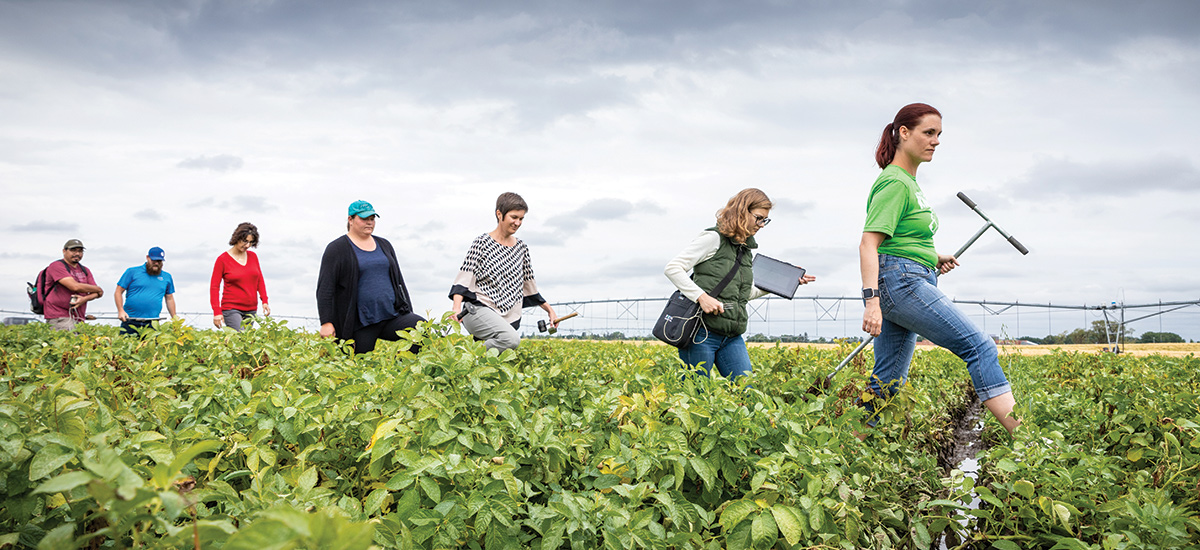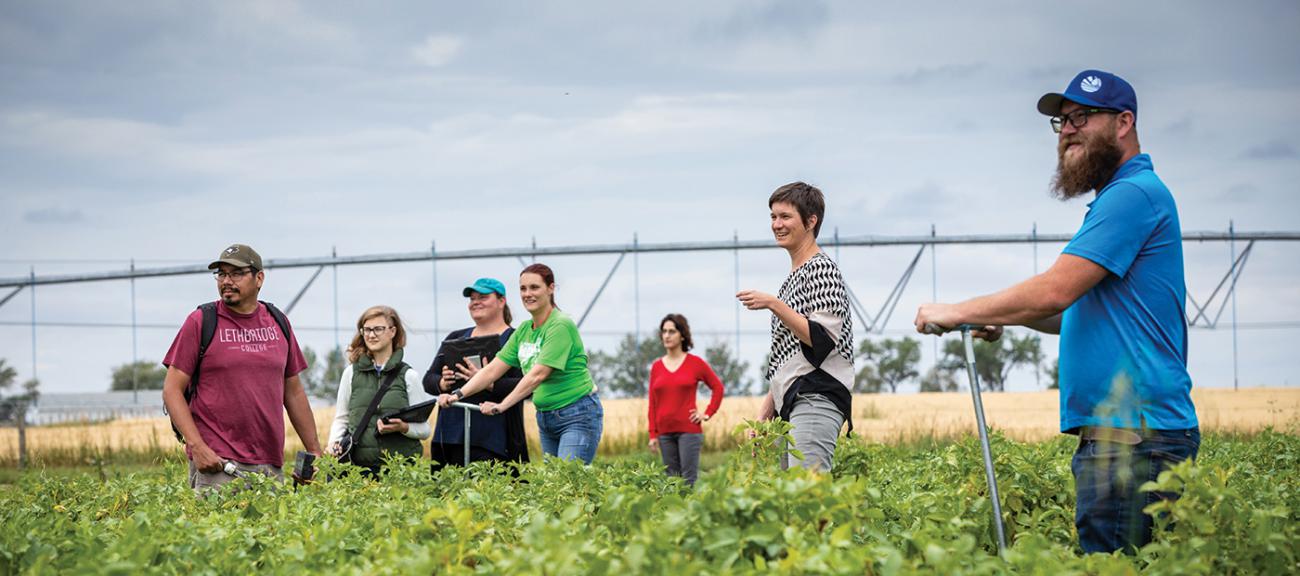Whether it’s Dr. Willemijn Appels digging trenches to monitor moisture levels in potato fields, Dr. Chandra Singh sifting through grain bins as part of his work on postharvest storage, or Dr. Nick Savidov feeding the fish in the aquaculture lab, researchers at Lethbridge College know you must sometimes get your hands dirty if you want to solve some of the biggest questions facing the agriculture sector. And that work wouldn’t be possible without collaboration with industry partners, clients, government agencies and other institutions.
Partnerships have been essential to pushing research forward at Lethbridge College since the late 1980s, when the college partnered with the Eastern Irrigation District (EID) to produce juvenile grass carp that were then grown and sold by the district to control aquatic vegetation in irrigation canals. This led to creation of the Aquaculture Centre of Excellence (ACE) in 1997 and the start of aquaponics research in 2003. In 2013, ACE received its first Natural Sciences and Engineering Research Council of Canada (NSERC) grant for aquaponics, followed by a five-year, $2.1 million grant in 2015 to make Integrated Fish and Plant Systems (IFPS) a commercially-viable food production solution.
Over the years as the college’s agricultural research capacity has expanded to include aquaponics, irrigation, crop production and post-harvest technology, so too has the number and scale of collaborations. Today, applied research at the college takes place under the umbrella of the Centre for Applied Research, Innovation and Entrepreneurship (CARIE). “We work with industry to deliver solutions in a timely manner that address their pressing needs, and as such, we are considered an economic driver,” says Dr. Kenny Corscadden, the college’s Associate Vice President of Research. “This collaborative approach, our industry-friendly intellectual property policy and the wide range of research services are real assets for our industry partners and clients. And in many cases, this results in relationships that extend beyond a specific project. These relationships are also essential to the growth and support of the agricultural innovation ecosystem in the region.”
CARIE received a major boost in April this year when NSERC awarded the college one of the most significant applied research grants in its history. The $1.75 million five-year renewable grant launched the Integrated Agriculture Technology Centre (IATC), which helps farmers, growers and food processors across the country tap into the latest research and recognized expertise at the college. “The ability to support local agriculture enterprises – including large- and small-scale crop producers, greenhouse growers, aquaculture operations, food processors, and ag-tech companies – and help them grow and scale represents a huge opportunity for the college and community,” says Megan Shapka, manager of the IATC and Innovation and Entrepreneurship.
Collaboration between researchers and industry, like the four-year project between the college and the Potato Growers of Alberta looking at how watering and irrigation methods affect southern Alberta’s potato crops, are a two-way street. Industry partners can benefit from the college’s expertise in applied research and history of finding solutions through technical services and consulting; in return, the college’s researchers get to test theories and technologies and push the boundaries of science.
Other projects, like the partnership between the college’s Aquaculture Centre of Excellence and the Granary Road Active Learning Park and Farmer’s Market outside of Calgary, can take applied research into the public eye by providing an educational experience.
The projects featured in the next few pages of Wider Horizons just scratch the surface of the complex, creative and collaborative work happening with the CARIE team. Watch for the college’s special annual research report this fall for more details and more exciting research developments.

From fish to fork at Granary Road
Recently the college teamed up with the Granary Road Active Learning Park and Farmer’s Market to create a working aquaponics facility at the park just southwest of Calgary. Aquaponics is the integrated culture of fish, plants and beneficial microorganisms grown in a soilless environment. Fish and plants grow in one ecosystem, eliminating the waste they separately produce by turning it into something of use. Fresh produce from the set-up, including salad greens and herbs, are then sold at the farmer’s market on site.
“The team from Lethbridge College was instrumental in assisting with the research, design, and ongoing support of our facility, the first in Canada,” says Granary Road founder Bret Walter. “This project would not have happened without the college’s support.”
Digging deep
“You can’t grow potatoes without irrigation in southern Alberta; and to get the perfect potato, you need the perfect soil moisture,” explains Dr. Willemijn Appels, Lethbridge College’s Mueller Applied Research Chair in Irrigation Science and lead researcher on a four-year study of how watering and irrigation methods affect southern Alberta’s potato crops. This project brings together the college, the Potato Growers of Alberta, local growers and potato processors McCain Foods, Lamb Weston, and Cavendish Farms. For Appels and her team, the project gives them access to large-scale growing operations to better compare different soil types and topographies, while observing growers’ current irrigation practices.
For growers looking to increase production to meet a growing demand for spuds, Appels’ research can help them use water more efficiently.
Breaking new ground
Clients from across the agriculture industry will gain access to applied research and development, technical services and consulting and training and education through the new Integrated Agriculture Technology Centre (IATC), with a focus on the college’s core research areas of aquaculture, crop production and wet processing. The centre has already started working with clients including Calgary-based organic fertilizer producer EarthRenew on a project that began in the spring of this year to help validate the efficacy of their organic fertilizer formulations.
“Lethbridge College was a natural choice for us because of the institution’s deep focus on agriculture, strong applied research focus and proximity to our site in central Alberta,” explains EarthRenew CEO Keith Driver. “We imagine these germination trials will mark the beginning of a long-standing scientific relationship with our colleagues at Lethbridge College.”
Want to work with our Ag researchers?
Do you have a challenge you are looking to solve? The Integrated Agriculture Technology Centre (IATC) is here to help Canadian agricultural businesses – particularly small- and medium-sized enterprises – by providing applied research, technical services and consulting to enhance productivity, competitiveness and innovation results. Visit IATC.ca to learn more about the services, expertise and funding opportunities available to help you solve your agricultural challenges.



